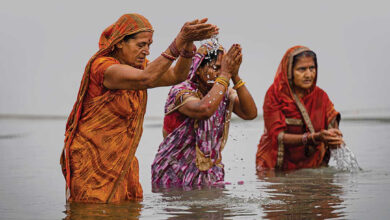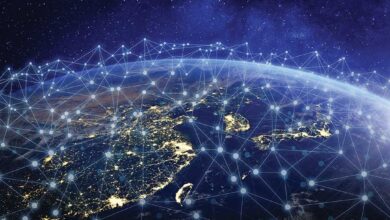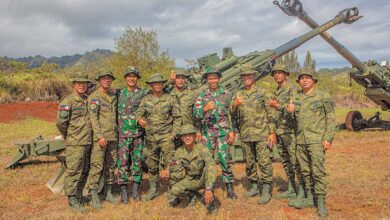Rising Sharp Power

Authoritarian regimes China and Russia increasingly manipulate, bully and distract to advance their agendas in democratic nations
FORUM Staff
The People’s Republic of China (PRC) and Russian governments are waging a new form of information warfare that increasingly relies on what is becoming known as “sharp power” — a term coined by researchers Christopher Walker and Jessica Ludwig in a December 2017 report by the National Endowment for Democracy.
The two authoritarian states have spent billions of dollars over the past decade to influence democracies in ways that have evolved beyond conventional conceptions of charm initiatives or propaganda campaigns. While most nations want to shape how the rest of the world sees them, these nations’ tactics are coercive, the authors revealed in the 156-page report, “Sharp Power: Rising Authoritarian Influence,” published by the Washington, D.C.-based foundation and think tank.
“What we have to date understood as authoritarian ‘soft power’ is better categorized as ‘sharp power’ that pierces, penetrates or perforates the political and information environments in the targeted countries. In the new competition that is under way between autocratic and democratic states, the repressive regimes’ ‘sharp power’ techniques should be seen as the tip of their dagger — or indeed as their syringe,” Walker and Ludwig wrote. Walker is vice president for studies and analysis at the foundation; Ludwig, a research and conference officer.

“This authoritarian influence is not principally about attraction or even persuasion; instead, it centers on distraction and manipulation. These ambitious authoritarian regimes, which systematically suppress political pluralism and free expression at home, are increasingly seeking to apply similar principles internationally to secure their interests,” the authors wrote.
“Sharp power, the deceptive use of information, is a type of hard power,” Joseph Nye explained in a January 2018 analysis of the report published in Foreign Affairs. Nye, a distinguished U.S. political scientist, introduced the term “soft power” to the world in a 1990 book. Although the PRC, like many nations, has used culture, visas, grants and investments to win foreign hearts and minds, its activities have become more subversive and pervasive.
In a 2017 interview with The Economist magazine, Anne-Marie Brady of the University of Canterbury in New Zealand described the PRC’s aggressive disinformation campaigns as a “new global battle” to “guide, buy or coerce political influence.”
Walker and Ludwig contend that democratic governments and societies must re-examine the way they respond to sharp power tactics, especially given the volume, nature and velocity of information moving online and through social media. Democracies should not only “inoculate themselves against malign authoritarian influence” but also “take a far more assertive posture on behalf of their own principles,” they argued in the report.
The authors analyzed case studies of the PRC’s and Russia’s activities in Argentina and Peru in South America and Poland and Slovakia in Central Europe for the report. They also reviewed evidence of the insidious ways the regimes are injecting their political narratives into other democracies, from Australia and New Zealand to Europe and Africa.
“Taken separately, authoritarian influence efforts in particular countries may seem fairly harmless or ineffectual. However, when the seemingly disparate activities of Russia and China around the world are added together, a far more disturbing picture emerges,” they concluded.
Exploiting Asymmetry
Although the PRC and Russia use different approaches, they both exploit the openness of democratic countries, while closing their own borders real and virtual to external influences, Walker and Ludwig explained.
The PRC, foremost, uses sharp power to suppress challenges to the regime’s presentation of itself, effectively manipulating and censoring messaging and behavior, the authors wrote. “The Chinese government often aims to portray the country as either a benign foreign influence or a successful example of economic development without democratic political institutions.” In addition, “embedded within China’s campaign to defend and promote its own one-party system is a tacit criticism of democracy as inefficient, chaotic, and a poor catalyst for economic development.”
The PRC has co-opted many of the conventional vehicles of democratic societies to deliver its sharp power initiatives and make the single-party regime seem more palatable to young democracies. It uses state-funded research centers, media outlets, language-training offerings through its Confucius Institutes and people-to-people exchanges to entice politicians, journalists, academics in young democracies in Latin America and elsewhere to alter policies and influence broader constituencies. In Australia, for example, Chinese entities have donated funds to political parties, individual candidates and universities, bought up space in newspapers to promote state views and suppressed debate on Australian campuses by controlling Chinese students, according to various news reports.

Ironically, inside China’s and Russia’s civil society sectors, unknown to many local actors in newer democracies, such avenues are closed to their citizens. “These efforts are part of the larger aim of Moscow and Beijing to get inside democratic systems in order to incentivize cooperation and neutralize criticism of their authoritarian regimes,” the authors explained. Moreover, they found that the PRC often pressures local allies, which usually include Chinese immigrant populations that the PRC has historically spied upon to control, to silence opposing voices and actors.
Sharp power “seeks to penetrate and subvert politics, media and academia, surreptitiously promoting a positive image of the country, and misrepresenting and distorting information to suppress dissent and debate,” Nye elaborated in his Foreign Affairs analysis. “China’s sharp power has three striking characteristics — it is pervasive, it breeds self-censorship and it is hard to nail down proof that it is the work of the Chinese state.”
Financial Coupling
Authoritarian states combine economic leverage with sharp power to further their political agendas, the National Endowment for Democracy report authors also found. “China is especially adroit in this regard, applying pressure with varying intensity and through indirect channels that are not always apparent unless one examines Chinese business activities in conjunction with Beijing’s other influence efforts.”
Money is instrumental in the PRC’s sharp power initiatives throughout Latin America, according to Juan Carlos Cardenal, a researcher at the Center for the Opening and Development of Latin America who authored report chapters on Latin America. In late 2016, Chinese President Xi Jinping pledged that China would train 10,000 Latin Americans by 2020. People-to-people engagements such as free trainings, exchange programs and scholarships in China have proven highly effective in winning over Latin America’s regional elites, Cardenal wrote.
The PRC uses various types of economic leverage around the world, according to Evan Feigenbaum, a senior fellow at the Asia Forum of the Carnegie Endowment for International Peace. The PRC uses its foreign direct investment to shape rules and norms in other countries to favor China. In Africa it has essentially forced nations to convert debt owed to China to equity, buy and hire Chinese workers, adopt Chinese technical and engineering standards and procurement rules, Feigenbaum wrote in a July 2017 article on the foundation’s website.
The PRC also applies economic pressure by restricting access to its domestic markets. For instance, China shut out the South Korean company Lotte Group, a chewing-gum maker and retail giant, after it provided the land to the South Korean government to house the terminal high-altitude area missile defense’s (THAAD) batteries. Within months of the signing of the land swap deal in February 2017, Chinese regulators closed most of the 112 Lotte Mart stores in China over supposed fire code violations, Reuters reported.
The PRC can also use a punitive approach. In November 2017, Mongolia allowed the Dalai Lama to visit its capital, Ulaanbaatar. In response, China implemented cross-border fees on Mongolian commodity exports, according to Feigenbaum. Then in January 2018, Chinese Foreign Minister Wang Yi said the Chinese government hoped Mongolia had “learned its lesson” and wouldn’t invite the Dalai Lama to return, The UB Post, Mongolia’s English-language news outlet, reported.
Russia’s Tactics
Meanwhile, Russia’s approach to sharp power more directly strives to undermine the health and credibility of democratic states.
“Whereas Beijing attempts to raise its profile and expand its power mainly through aggressive investment, co-optation, and dishonest salesmanship, Moscow hopes to level the playing field largely by dragging down its democratic adversaries, either in appearance or in reality,” the report authors explained.
Russia preys upon existing frustrations and cynicism of local communities to provoke unrest and corrupt public policies, according to Jacek Kucharczyk, president of the Institute of Public Affairs, a Polish think tank. Kucharczyk authored a chapter on political polarization in Poland for the National Endowment for Democracy report.

Russia employs similar tactics to those used by the PRC to undermine its enemies in the international community. The Russian government has worked to undermine Poland’s support for Ukraine’s new democratic government by keeping narratives about historic tensions between two countries alive, Kucharcyzk found. The Russian government also strives to destroy Poland’s and Slovakia’s sense of belonging to the European and trans-Atlantic communities, as well as their democratic governance, according to the report.
There are “many dangerous liaisons between specific political narratives employed by homegrown populists and Russian propaganda, as well as calculated efforts by the PRC to portray itself as an ultramodern, benevolent power featuring an authoritarian political system that offers a better incubator for economic growth than liberal democracy,” Kucharczyk wrote.
Russia, even more than the PRC, has expanded its state media internationally and dissemination of disinformation into other countries, including its efforts to interfere in foreign elections. In Poland, for example, third-party websites often pick up stories from Russian media, making it more credible to the local population, which would be less likely to trust a Russian source, Kucharczyk explained. At the same time, authoritarian regimes, and the PRC in particular, restrict their citizens’ access to the internet and use of social media platforms and censor news and online content. In this way, the regimes exploit advantages of globalization, but reject the tenets of free and open exchanges and transparency inside their borders.
Moreover, the PRC’s and Russia’s targeting of newly created democracies, which are more vulnerable, is especially troubling, given the strategic value of these nations to democracies, Walker and Ludwig concluded.
The United States and its allies and partners must adopt new measures and tools that build upon democratic values to counter the PRC and Russia in their international campaigns for control of information and ideas. The authors caution that if “powerful democracies do not rise to the challenge, they will be abdicating their leadership roles, abandoning their allies, and neglecting their own long-term security.”
“Should these and other well-resourced autocratic regimes maintain their current momentum for the foreseeable future, their efforts could do grievous damage to the integrity of young democracies. This in turn would deliver a devastating blow to the rules-based international order that has underpinned global security and prosperity,” they warned.
Five key messaging steps to counter the attempted coercion of democracies by China’s and Russia’s Regimes
Address the shortage of information on the People’s republic of china (PRC) and Russia. In the four democracies examined, information concerning the Chinese political system and its foreign policy strategies tends to be extremely limited. There are few journalists, editors and policy professionals who possess a deep understanding of the PRC and can share their knowledge with the rest of their societies. The same holds true for Russia in places such as Latin America, though knowledge of today’s Russia is stronger in Central Europe.
Unmask authoritarian influence. PRC and Russian sharp power efforts rely in large part on camouflage — disguising state-directed projects as the work of commercial media or grassroots associations, for example, or using local actors as conduits for foreign propaganda and tools of foreign manipulation. To counteract these efforts at misdirection, observers in democracies should put them under the spotlight and analyze them in a comprehensive manner.
Inoculate democratic societies against malign authoritarian influence. Once the nature and techniques of authoritarian influence efforts are exposed, democracies should build up their internal defenses. Authoritarian initiatives are directed at cultivating relationships with the political elites, thought leaders and other information gatekeepers of democratic societies. Moscow and Beijing aim to get inside democratic systems to win supporters and to neutralize criticism of their authoritarian regimes.
Reaffirm support for democratic values and ideals. If one goal of authoritarian sharp power is to legitimize illiberal forms of government, then it is effective only to the extent that democracies and their citizens lose sight of their own principles. Top leaders in the democracies must speak out clearly and consistently on behalf of democratic ideals and put down clear markers regarding acceptable standards of democratic behavior.
Re-conceptualize ‘soft power.’ Finally, journalists, think tank analysts and other policy elites need to recognize authoritarian influence efforts in the realm of ideas for what they are: corrosive and subversive “sharp power” instruments that do real damage to the targeted democratic societies. The conceptual vocabulary that has been used since the Cold War’s end no longer seems adequate to describe the contemporary situation.
Source: Christopher Walker and Jessica Ludwig, “Sharp Power: Rising Authoritarian Influence,” National Endowment for Democracy, December 2017




